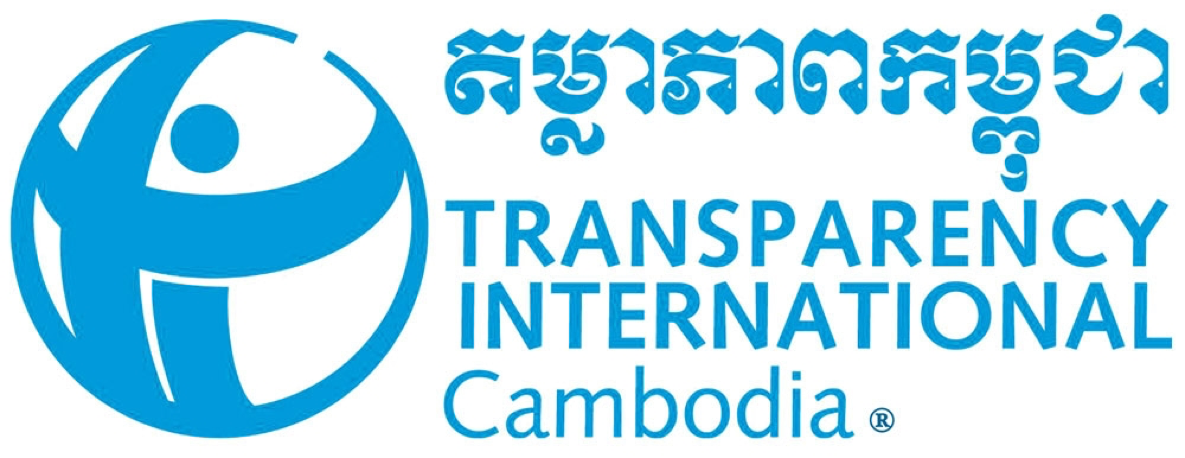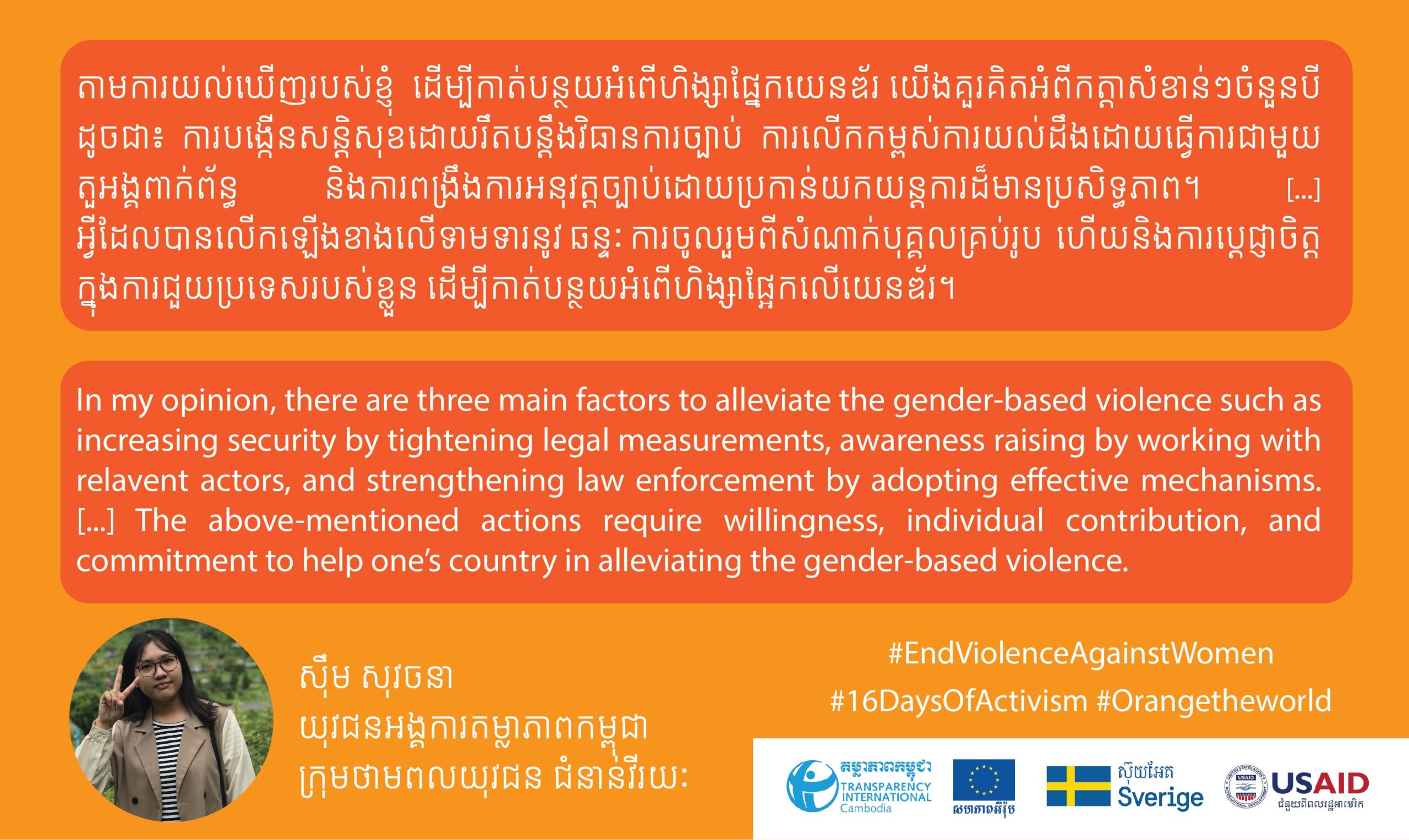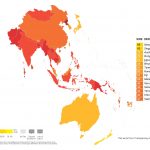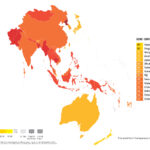Youth’s Voice: How to Alleviate the Gender-based Violence in Their Community – Sim Sovachana
Gender-based violence (GBV) is an umbrella term for any dissenting act committed against a person based on a power imbalance between men and women, men and men, or women and women. It is a serious human rights violation and a life-threatening health and protection issue. Gender-based violence can include sexual, physical, mental, and economic harm that occurs in public or private places. It also includes the threat of violence, coercion, and manipulation. The consequences of gender-based violence are devastating and can have lifelong consequences for survivors. It can even lead to death. Times of conflict see an increase in GBV, and women often suffer the consequences of sexual violence and exploitation.
Gender-based violence is a widespread problem in Cambodian society and is inextricably linked to women’s inability to understand their human rights. Such violence can take many forms and can be perpetrated by many individuals and institutions. According to the National Survey on Women’s Health and Life Experiences in Cambodia, conducted by the National Institute of Statistics of the Ministry of Planning and Ministry of Women’s Affairs in 2015, 20% of Cambodian women reported experiencing physical or sexual violence from an intimate partner (CCHR, 2018). In recent years, Cambodia has taken steps to combat discrimination, along with other actors, including civil society organizations. However, the remaining issues require further action. Cambodia must adopt meaningful measures to combat violence against women and move towards a future of respect for women’s rights. This essay, therefore, aims to explore three willingness on how to alleviate the gender-based violence in Cambodia.
Initially, security measures must be tightened. Due to security lacking in community, many gender-based violence cases were happened even at day or night. It is vital to set up a community watch group by contacting the local police authorities. Most police departments can advise on the formation of these types of groups. Moreover, street light can hide any suspicious activity. If street lighting is inadequate, contact homeowners’ association or local government for safer lighting. Encourage local businesses and residents to set up motion-activated outdoor lighting as well. On the other hand, private security services can do things that local police cannot do: they can patrol the neighborhood more often and respond more quickly to suspicious activity to increase security. If the community can raise money together, it can access reliable security services.
Secondly, awareness raising helps to alleviate the gender-based violence in community. Institution or organization must work with government and community partners to address GBV and implement quality programs to prevent, reduce and respond. Awareness raising can strengthen coordination and programs to protect women and girls from GBV. The above-mentioned actors must advocate for sufficient resources to increase the implementation of quality specialized programs for women and girls.
Besides working with women, NGOs, IGOs, IOs and other partners, it should be noted that working with men who have survived sexual violence and survivors with mixed sexual orientation and gender identity (SOGI) through specialized programs to meet their specific needs is very necessary. Based on CRP (Collateral Repair Project), it believes that men have an important role to play in preventing and combating GBV, both in speaking out against violence against women and girls and in fighting dangerous patterns that serve to normalize gender inequality. It is very crucial to work not only with women but also with men to address the standards that support GBV. Involvement of male beneficiaries in preventive work is an important way to reduce stalking as well as domestic and sexual violence in their respective communities.
Finally, government should execute the laws toward gender-based violence. Government should strengthen any meaningful measures to combat gender-based violence. At the same time, it is clear that the law alone will not eliminate gender-based violence is not enough. Some level of legal protection is now on paper in most countries of the world, but violence is still widespread and enforcement is weak. Addressing only the consequences of violence has obvious weaknesses that are not insignificant, as the causes of the violence may be unresolved. Thus, government should seriously work to adopt effective mechanism to combat gender-based violence by any means.
In conclusion, in my opinion, there are three main factors to alleviate the gender-based violence in Cambodia such as increasing security by tightening legal measurements, awareness raising by working with other actors and execute the laws by strengthening meaningful measures and adopt any effective mechanisms. Both women and men experience gender-based violence, but most of the victims are women and girls. When a woman shares her story of violence, she takes the first step to break the cycle of abuse. It is up to all of us to give her the safe space she needs to speak and listen. It is important to remember that when discussing cases of sexual violence, a victim’s sobriety, clothing and sex of the victim are irrelevant. The above-mentioned actions require willingness, individual contribution, and commitment to help one’s country in alleviating the gender-based violence.
Author: Sim Sovachana, a senior majoring International Relations at Department of International Studies, Institute of Foreign Languages, Royal University of Phnom Penh
CCHR. (2018, December). Fact Sheet: Violence Against Women in Cambodia. Retrieved from CCHR Cambodia: https://cchrcambodia.org/admin/media/factsheet/factsheet/english/CCHR%20Factsheet_Violence%20Against%20Women_ENG.pdf
 English
English





